Search
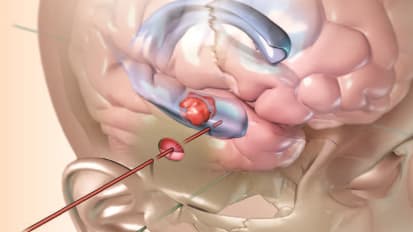 Document
Document
Cerebrovascular Neurosurgery
As one of the highest volume and most experienced surgical programs in the nation for cerebrovascular disorders, we offer a wide range of treatment options tailored to each patient, leading to safer surgeries and better outcomes.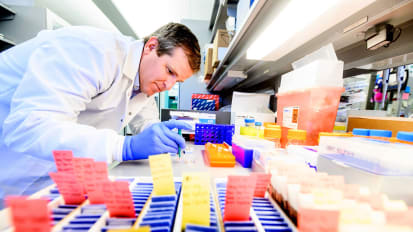 News
News
Genomic Sequencing Is Changing Diagnosis, Treatment for Patients with Brain Cancer
Patients diagnosed with a type of brain tumor survived for longer when they were treated aggressively with surgery, radiation and chemotherapy.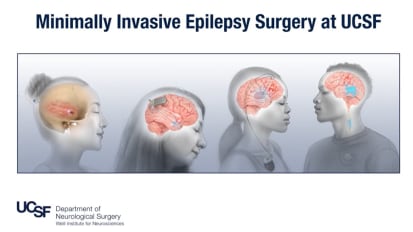 Video
Video
Surgery for Epilepsy: Advanced Techniques and Appropriate Candidates
Many patients with uncontrolled seizures are unaware that they can be helped – and providers have an opportunity to start them toward a better quality of life simply by explaining the latest options. News
News
Seizures Stopped, Speech Preserved After Rare Auditory Cortex Tumor is Removed: A UCSF Case Study
The extraordinary success was made possible through research on the neural mechanisms of speech by Edward Chang, MD, UCSF neurosurgeon and chair of the Department of Neurological Surgery, and an advanced phase 2 surgical evaluation by the UCSF Epilepsy Center team.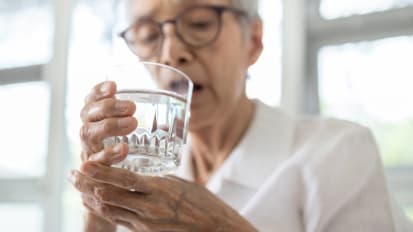 Video
Video
The Value of Focused Ultrasound for Essential Tremor: Safety, Precision, Sustained Results
The most common movement disorder, essential tremor often doesn’t respond to meds and depresses quality of life. As neurosurgeon Doris Wang, MD, PhD, explains in this short, information-packed presentation, focused ultrasound can bring immediate and lasting relief to many. News
News
Positive Patient Outcomes With Minimally Invasive Skull Base Surgery: UCSF Case Studies
The following case studies describe how Ezequiel (Eze) Goldschmidt, MD, PhD, and the UCSF Brain Tumor Center team used the EEA to successfully remove different types of tumors, including a pituitary adenoma, a craniopharyngioma, an epidermoid cyst and a chondrosarcoma.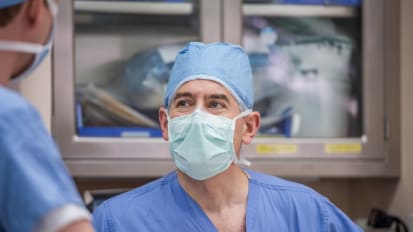 News
News
Deep Brain Stimulation for Medication-Resistant Dystonia: A UCSF Case Study
A 10-year-old boy developed left-foot inversion, which made it difficult for him to walk. He subsequently developed a tremor in his right arm, and then his neck and trunk began to twist. He was seen by several practitioners but did not get a correct diagnosis. At age 17, he was referred to the UCSF Movement Disorders and Neuromodulation Center. News
News
Endoscopic Removal of a Giant Pituitary Adenoma: A UCSF Case Study
A patient’s giant pituitary adenoma was successfully removed at UC San Francisco via endoscopic transsphenoidal surgery, a technique that offers exceptional visualization. News
News
Patients with Intractable Headaches Find Relief at the UCSF Inpatient Headache Unit
UCSF Inpatient Headache Unit treats patients with headache disorders through intravenous infusions of medications such as dihydroergotamine, chlorpromazine and valproate. Patients experiencing frequent and severe migraine, cluster, post-traumatic and other headaches have had their pain alleviated through this service, which is offered by the UCSF Headache Center.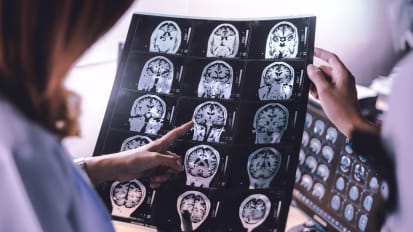 Document
Document
Referral Guide for Physicians - Neurology and Neurological Surgery
Referral and specialty care clinic information provided by UC San Francisco’s departments of Neurology and Neurological Surgery. News
News
Cognitive Ability Improved in Low-Grade Glioma Patients Treated at UCSF
With advanced treatments improving survival outcomes for patients with low-grade gliomas, clinicians and researchers at UC San Francisco’s Brain Tumor Center are working to enhance the cognitive improvement of these individuals as well. News
News
State-of-the-Art Weill Neurosciences Building Opens at UCSF
The Joan and Sanford I. Weill Neurosciences Building opened its doors in July 2021, establishing an innovative all-in-one hub for patients, researchers and clinicians at UC San Francisco’s Mission Bay campus.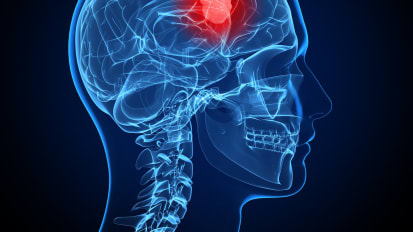 News
News
John de Groot, MD, Named Division Chief of Neuro-Oncology at UCSF
John F. de Groot, MD, has been named the new chief of the Division of Neuro-Oncology within the Department of Neurological Surgery at UC San Francisco.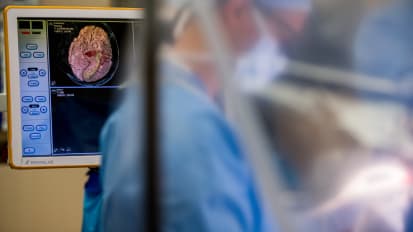 News
News
First “Neuroprosthesis” Restores Words and Mobility to Man with Paralysis
Researchers at UC San Francisco have developed the first “neuroprosthesis” that has enabled a man with severe paralysis to communicate in sentences, translating signals from his brain to the vocal tract directly into words that appear as text on a screen. Aided by this technology, the man is also able to move a robotic arm to manipulate objects. News
News
New Method for Rapid, Intraoperative Detection of Residual Tumor Cells Can Vastly Improve Patient Outcomes
It is now possible to detect residual tumor cells during surgery within minutes, a groundbreaking advancement in the surgical treatment of tumors.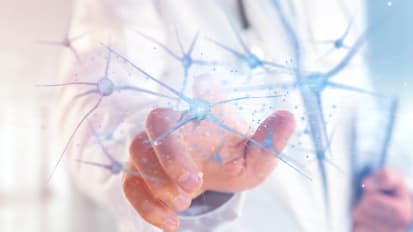 News
News
Novel Sequencing Test to Uncover Mystery Causes of Brain Inflammation Now Available at UCSF
Physicians seeking a cause for tough-to-diagnose cases of encephalitis or meningitis have a new tool in their arsenal, thanks to scientists at UC San Francisco’s Center for Next-Gen Precision Diagnostics.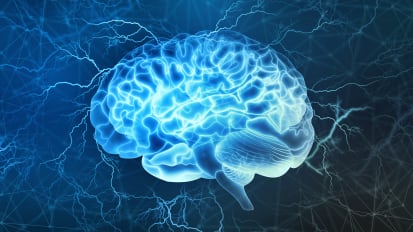 News
News
New Complex Neurology Program Focuses on Hard-to-Diagnose Cases
In an effort to find answers to some of the most daunting neurological puzzles frustrating patients and clinicians alike, UC San Francisco has opened the Jan and Maria Manetti Shrem UCSF Neurology Complex Diagnosis Clinic, an innovative multidisciplinary center that tackles these issues head-on. News
News
Brain Wave Recordings Reveal Potential for Individualized Parkinson’s Treatments
Pioneering neural recordings in patients with Parkinson’s disease by UC San Francisco scientists are providing the groundwork for personalized brain stimulation to treat Parkinson’s and other neurological disorders. Document
Document
Headache Center Inpatient Referral Guide
As the only program with an Inpatient Headache Treatment Unit in Northern California, UCSF’s Headache Center helps improve the quality of life for individuals suffering from debilitating headaches. Document
Document
UCSF MD Link: Web-Based Communication Portal for Physicians
Our web portal allows referring physicians to securely access their patients’ entire electronic health record, make online referral requests and communicate with our physicians directly and securely.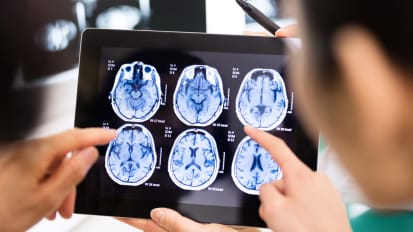 News
News
Optimizing Care Following Traumatic Brain Injury: Rapid Laboratory Test Offers Opportunity for Paradigm Shift
The Centers for Disease Control and Prevention (CDC) estimates that there are approximately 2.5 million traumatic brain injury (TBI)-related emergency department (ED) visits annually. Recent media coverage has focused on the occurrence of TBI in professional sports, but the reality is that the impact of TBI-related morbidity extends beyond high-level athletics. Video
Video
Look Beyond Symptoms: When to Test for Pituitary Tumors
Tumors of the body’s “master gland” cause various symptoms – headaches, depression, sexual dysfunction, vision loss – that doctors often attribute to other conditions. UCSF endocrinology and neurosurgery specialists discuss keys to identifying patients as well as the merits of telehealth referrals in the time of COVID. News
News
The Coronavirus Disease 2019 Global Pandemic: A Neurosurgical Treatment Algorithm
The COVID-19 pandemic is disrupting neurosurgical care at medical centers throughout the United States. News
News
Neurosurgical Treatment Algorithm During the COVID-19 Pandemic
As medical centers across the world prepare for and respond to the COVID-19 pandemic, guidelines for providing vital care, while protecting the safety of both patients and health care workers, are increasingly critical.

